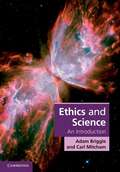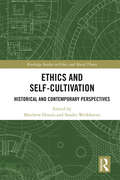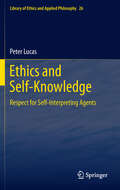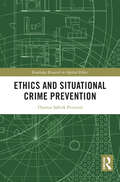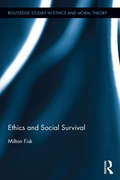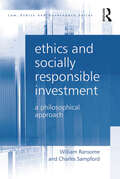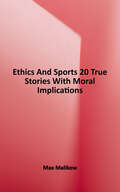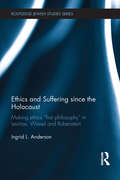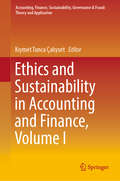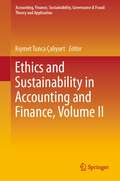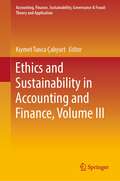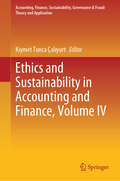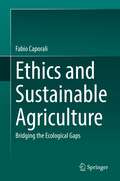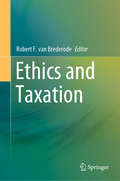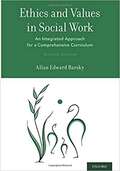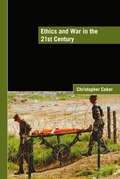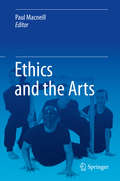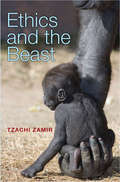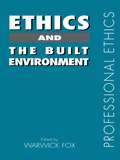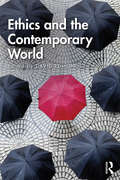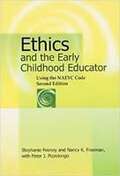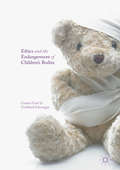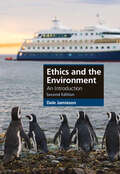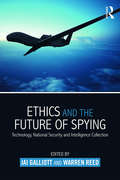- Table View
- List View
Ethics and Science
by Carl Mitcham Adam BriggleWho owns your genes? What does climate science imply for policy? Do corporations conduct honest research? Should we teach intelligent design? Humans are creating a new world through science. The kind of world we are creating will not simply be decided by expanding scientific knowledge, but will depend on views about good and bad, right and wrong. These visions, in turn, depend on critical thinking, cogent argument and informed judgement. In this book, Adam Briggle and Carl Mitcham help readers to cultivate these skills. They first introduce ethics and the normative structure of science and then consider the 'society of science' and its norms for the responsible conduct of research and the treatment of human and animal research subjects. Later chapters examine 'science in society' - exploring ethical issues at the interfaces of science, policy, religion, culture and technology. Each chapter features case studies and research questions to stimulate further reflection.
Ethics and Self-Cultivation: Historical and Contemporary Perspectives (Routledge Studies in Ethics and Moral Theory)
by Sander Werkhoven Matthew DennisThe aim of Ethics and Self-Cultivation is to establish and explore a new ‘cultivation of the self’ strand within contemporary moral philosophy. Although the revival of virtue ethics has helped reintroduce the eudaimonic tradition into mainstream philosophical debates, it has by and large been a revival of Aristotelian ethics combined with a modern preoccupation with standards for the moral rightness of actions. The essays comprising this volume offer a fresh approach to the eudaimonic tradition: instead of conditions for rightness of actions, it focuses on conceptions of human life that are best for the one living it. The first section of essays looks at the Hellenistic schools and the way they influenced modern thinkers like Spinoza, Kant, Nietzsche, Hadot, and Foucault in their thinking about self-cultivation. The second section offers contemporary perspectives on ethical self-cultivation by drawing on work in moral psychology, epistemology of self-knowledge, philosophy of mind, and meta-ethics.
Ethics and Self-Knowledge
by Peter LucasThis book explores the theoretical basis of our ethical obligations to others as self-knowing beings - this task being envisaged as an essential supplement to a traditional ethic of respect for persons. Authoritative knowledge of others brings with it certain obligations, which are reflected in (inter alia) the moral and legal safeguards designed to ensure that certain information is 'put out of play' for job selection purposes etc. However, the theoretical basis for such obligations has never been fully clarified. This book begins by identifying a distinctive class of 'interpretive' moral wrongs (including stereotyping, discrimination and objectification). It then shows how our obligations in respect of these wrongs can be understood, drawing on insights from the tradition of philosophical reflection on recognition. The book will be of interest to anyone concerned with the adequacy of a modern ethic of respect for persons - particularly in applied and professional ethics.
Ethics and Situational Crime Prevention (Routledge Research in Applied Ethics)
by Thomas Søbirk PetersenThis book addresses the ethics of Situational Crime Prevention (SCP). It seeks not only to analyse specific SCP measures but to demonstrate how ethical analysis can support and improve the implementation of SCP strategies.In ethically analysing a particular SCP measure, it is not enough to look at empirical data. Even if a measure is effective at preventing crime, it may turn out to be ethically unattractive because it harms more people than it benefits, or because it violates our right to free movement. The book proceeds from the assumption that decision-making about whether we should use SCPs can only be conducted by carefully identifying, clarifying, and critically evaluating the ethical arguments for and against use of the SCP measure in question. The author analyses several SCP strategies that have not been treated in detail in criminology or applied ethics literatures. These SCP strategies include gated communities, excluding people with a criminal record from housing or employment, the use of hostile design in public spaces, and the implementation of intelligent speed adaption in vehicles.Ethics and Situational Crime Prevention is an essential resource for criminologists, moral philosophers, legal scholars, and social scientists with an interest in crime prevention.
Ethics and Social Survival (Routledge Studies in Ethics and Moral Theory)
by Milton FiskWhen speaking of society’s role in ethics, one tends to think of society as regimenting people through its customs. Ethics and Social Survival rejects theories that treat ethics as having justification within itself and contends that ethics can have a grip on humans only if it serves their deep-seated need to live together. It takes a social-survival view of ethical life and its norms by arguing that ethics looks to society not for regimentation by customs, but rather for the viability of society. Fisk traces this theme through the work of various philosophers and builds a consideration of social divisions to show how rationalists fail to realize their aim of justifying ethical norms across divisions. The book also explores the relation of power and authority to ethics—without simply dismissing them as impediments—and explains how personal values such as honesty, modesty, and self-esteem still retain ethical importance. Finally, it shows that basing ethics on avoiding social collapse helps support familiar norms of liberty, justice, and democracy, and strives to connect global and local ethics.
Ethics and Socially Responsible Investment: A Philosophical Approach (Law, Ethics And Governance Ser.)
by Charles Sampford William RansomeThis volume breaks new ground by approaching Socially Responsible Investment (SRI) as an explicitly ethical practice in financial markets. The work explains the philosophical and practical shortcomings of ’long term shareholder value’ and the origins and conceptual structure of SRI, and links its pursuit to both its deeper philosophical foundations and the broader, multi-dimensional global movement towards greater social responsibility in global markets. Interviews with fund managers in the Australian SRI sector generate recommendations for better integrating ethics into SRI practice via ethically informed engagement with invested companies, and an in-depth discussion of the central practical SRI issue of fiduciary responsibility strengthens the case in favour of SRI. The practical and ethical theoretical perspectives are then brought together to sketch out an achievable ideal for SRI worldwide, in which those who are involved in investment and business decisions become part of an ’ethical chain’ of decision makers linking the ultimate owners of capital with the business executives who frame, advocate and implement business strategies. In between there are investment advisors, fund managers, business analysts and boards. The problem lies in the fact that the ultimate owners are discouraged from considering their own values, or even their own long term interests, whilst the others often look only to short term interests. The solution lies in the latter recognising themselves as links in the ethical chain.
Ethics and Sports: 20 True Stories with Moral Implications
by Max MalikowEthics and Sports is a narration of a series of true sports stories. Dr. Malikow follows the stories with questions featuring morality and how it may be applied to the reader’s future moral dilemmas.
Ethics and Suffering since the Holocaust: Making Ethics "First Philosophy" in Levinas, Wiesel and Rubenstein (Routledge Jewish Studies Series)
by Ingrid L AndersonFor many, the Holocaust made thinking about ethics in traditional ways impossible. It called into question the predominance of speculative ontology in Western thought, and left many arguing that Western political, cultural and philosophical inattention to universal ethics were both a cause and an effect of European civilization's collapse in the twentieth century. Emmanuel Levinas, Elie Wiesel and Richard Rubenstein respond to this problem by insisting that ethics must be Western thought's first concern. Unlike previous thinkers, they locate humanity's source of universal ethical obligation in the temporal world of experience, where human suffering, rather than metaphysics, provides the ground for ethical engagement. All three thinkers contend that Judaism’s key lesson is that our fellow human is our responsibility, and use Judaism to develop a contemporary ethics that could operate with or without God. Ethics and Suffering since the Holocaust explores selected works of Levinas, Wiesel, and Rubenstein for practical applications of their ethics, analyzing the role of suffering and examining the use each thinker makes of Jewish sources and the advantages and disadvantages of this use. Finally, it suggests how the work of Jewish thinkers living in the wake of the Holocaust can be of unique value to those interested in the problem of ethics in the twentieth and twenty-first centuries. Presenting a thorough investigation of the work of Levinas, Wiesel and Rubinstein, this book is of key interest to students and scholars of Jewish studies, as well as Jewish ethics and philosophy.
Ethics and Sustainability in Accounting and Finance, Volume I (Accounting, Finance, Sustainability, Governance & Fraud: Theory and Application)
by Kıymet Tunca ÇalıyurtThis book discusses recent developments relating to ethical and sustainable issues in accounting & finance. Accounting is often seen as a technical discipline that records, classifies and reports financial transactions. However, since the financial information produced concerns all interest groups both within and outside the enterprise, accounting also has social characteristics and involves multi-faceted duties and responsibilities. As such, in addition to basic principles and accepted rules and standards in the field, this book focuses on the ethical aspects and fundamentals of this profession that accountants should also take into consideration, as this is the only way to build and preserve society’s confidence in accounting and increase its social credibility.
Ethics and Sustainability in Accounting and Finance, Volume II (Accounting, Finance, Sustainability, Governance & Fraud: Theory and Application)
by Kıymet Tunca ÇalıyurtThis book continues the discussion on recent developments relating to ethical and sustainable issues in accounting & finance from Ethics and Sustainability in Accounting and Finance, Volume I. Accounting is often seen as a technical discipline that records, classifies and reports financial transactions. However, since the financial information produced concerns all interest groups both within and outside the enterprise, accounting also has social characteristics and involves multi-faceted duties and responsibilities. As such, in addition to basic principles and accepted rules and standards in the field, this book focuses on the ethical aspects and fundamentals of this profession that accountants should also take into consideration, as this is the only way to build and preserve society’s confidence in accounting and increase its social credibility.
Ethics and Sustainability in Accounting and Finance, Volume III (Accounting, Finance, Sustainability, Governance & Fraud: Theory and Application)
by Kıymet Tunca ÇalıyurtThis book continues the discussion on recent developments relating to ethical and sustainable issues in accounting and finance from the book , Volumes I and II, looking into topics such as the importance of good governance in accounting, tax, auditing and fraud examination, ethics, sustainability, environmental issues and new technologies and their effects on accounting and finance, focusing in particular on environmental and sustainability reporting in the oil and gas and banking sectors. The book also considers the growing importance of audit quality in this time of the COVID-19 pandemic.
Ethics and Sustainability in Accounting and Finance, Volume IV (Accounting, Finance, Sustainability, Governance & Fraud: Theory and Application)
by Kıymet Tunca ÇalıyurtThis book continues the discussion on recent developments relating to ethical and sustainable issues in accounting and finance from Volumes I to III, looking into topics such as the importance of good governance in accounting, tax, auditing and fraud examination, ethics, sustainability, environmental issues, and new technologies and their effects on accounting and finance, focusing in particular on environmental and sustainability reporting in the oil and gas and banking sectors.
Ethics and Sustainable Agriculture: Bridging the Ecological Gaps
by Fabio CaporaliThis book describes the alarming condition of agriculture in the Anthropocene, when the ethical conception of agriculture as a service of common utility for both society and environment has progressively been marginalized. The ethical utility of agriculture has been sidetracked with the increasing industrialisation of society, the involvement of agriculture in the business-as-usual economy, and the consequential environmental and societal impacts it has had. Thus, re-establishing a meaningful bridge between ethics and agriculture is necessary. A relatively new science (ecology) with both a new epistemological tool (that of the ecosystem concept), and a unique narrative of sustainable development, can help bridge this gap. This book focuses on ethics as a lever for raising scientific, technical, social, economic and political solutions to adopt in agriculture as a model of symbiotic relationships between man and nature. It provides a detailed discussion of the ecological intensification practices in order to maximize ecological and ethical services, wherein agroecosystems will follow.
Ethics and Taxation
by Robert F. van BrederodeThis book does not present a single philosophical approach to taxation and ethics, but instead demonstrates the divergence in opinions and approaches using a framework consisting of three broad categories: tax policy and design of tax law; ethical standards for tax advisors and taxpayers; and tax law enforcement. In turn, the book addresses a number of moral questions in connection with taxes, concerning such topics as: • the nature of government • the relation between government (the state) and its subjects or citizens • the moral justification of taxes• the link between property and taxation• tax planning, evasion and avoidance • corporate social responsibility• the use of coercive power in collecting taxes and enforcing tax laws • ethical standards for tax advisors • tax payer rights • the balance between individual rights to liberty and privacy, and government compliance and information requirements • the moral justification underlying the efforts of legislators and policymakers to restructure society and steer individual and corporate behavior.
Ethics and Values in Social Work: An Integrated Approach for a Comprehensive Curriculum
by Allan Edward BarskySocial work ethics provide practitioners with guidance on how to promote social work values such as respect, social justice, human relationships, service, competence, and integrity. Students entering the profession need to develop a real-world understanding of how to apply these values in practice while also managing the dilemmas that arise when social workers, clients, and others encounter conflicting values and ethical obligations. <p><p>Ethics and Values in Social Work offers a comprehensive set of teaching and learning materials to help students develop the knowledge, self-awareness, and critical thinking skills required to handle values and ethical issues in all levels of practice--individual, family, group, organization, community, and social policy. BSW and MSW students will particularly appreciate how complex ethical obligations and theories have been translated into plain language. Additionally, the comprehensive set of case examples and exercises provides realistic scenarios to develop critical thinking and problem solving skills across a range of practice situations.
Ethics and War in the 21st Century (Lse International Studies Ser.)
by Christopher CokerThis book explores the ethical implications of war in the contemporary world. The author, a leading theorist of warfare, explains why it is of crucial importance that Western countries should continue to apply traditional ethical rules and practices in war, even when engaging with international terrorist groups.The book uses the work of the late Am
Ethics and the Arts
by Paul MacneillThis book proposes that the highest expression of ethics is an aesthetic. It suggests that the quintessential performance of any field of practice is an art that captures an ethic beyond any literal statement of values. This is to advocate for a shift in emphasis, away from current juridical approaches to ethics (ethical codes or regulation), toward ethics as an aesthetic practice--away from ethics as a minimal requirement, toward ethics as an aspiration. The book explores the relationship between art and ethics: a subject that has fascinated philosophers from ancient Greece to the present. It explores this relationship in all the arts: literature, the visual arts, film, the performing arts, and music. It also examines current issues raised by 'hybrid' artists who are working at the ambiguous intersections between art, bio art and bioethics and challenging ethical limits in working with living materials. In considering these issues the book investigates the potential for art and ethics to be mutually challenged and changed in this meeting. The book is aimed at artists and students of the arts, who may be interested in approaching ethics and the arts in a new way. It is also aimed at students and teachers of ethics and philosophy, as well as those working in bioethics and the health professions. It will have appeal to the 'general educated reader' as being current, of considerable interest, and offering a perspective on ethics that goes beyond a professional context to include questions about how one approaches ethics in one's own life and practices.
Ethics and the Beast: A Speciesist Argument for Animal Liberation
by Tzachi ZamirMany people think that animal liberation would require a fundamental transformation of basic beliefs. We would have to give up "speciesism" and start viewing animals as our equals, with rights and moral status. And we would have to apply these beliefs in an all-or-nothing way. But in Ethics and the Beast, Tzachi Zamir makes the radical argument that animal liberation doesn't require such radical arguments--and that liberation could be accomplished in a flexible and pragmatic way. By making a case for liberation that is based primarily on common moral intuitions and beliefs, and that therefore could attract wide understanding and support, Zamir attempts to change the terms of the liberation debate. Without defending it, Ethics and the Beast claims that speciesism is fully compatible with liberation. Even if we believe that we should favor humans when there is a pressing human need at stake, Zamir argues, that does not mean that we should allow marginal human interests to trump the life-or-death interests of animals. As minimalist as it sounds, this position generates a robust liberation program, including commitments not to eat animals, subject them to factory farming, or use them in medical research. Zamir also applies his arguments to some questions that tend to be overlooked in the liberation debate, such as whether using animals can be distinguished from exploiting them, whether liberationists should be moral vegetarians or vegans, and whether using animals for therapeutic purposes is morally blameless.
Ethics and the Built Environment: Human Relationships, Nature, And The Built Environment (Professional Ethics)
by Warwick FoxMuch has been written in recent years on environmental ethics relating to the more general 'natural' environment but little specifically written about ethics of the built environment. Ethics and the Built Environment responds to this need and offers a debate on the ethical dimension of building in all its forms from a variety of disciplinary perspectives and approaches.This book should be of interest to architects, students of building and building design, environmentalists, politicians and general readers with an interest in ethics.
Ethics and the Contemporary World
by David EdmondsArguments about ethics often centre on traditional questions of, for instance, euthanasia and abortion. Whilst these questions are still in the foreground, recent years have seen an explosion of new moral problems. Moral and political clashes are now as likely to be about sexuality and gender and the status of refugees, immigrants and borders, or the ethics of social media, safe spaces, disability and robo-ethics. How should we approach these debates? What are the issues at stake? What are the most persuasive arguments? Edited by best-selling philosophy author David Edmonds, Ethics and the Contemporary World assembles a star-studded line-up of philosophers to explore twenty-five of the most important ethical problems confronting us today. They engage with moral problems in race and gender, the environment, war and international relations, global poverty, ethics and social media, democracy, rights and moral status, and science and technology. Whether you want to learn more about the ethics of poverty, food, extremism, or artificial intelligence and enhancement, this book will help you understand the issues, sharpen your perspective and, hopefully, make up your own mind.
Ethics and the Early Childhood Educator: Using the NAEYC Code (2nd Edition)
by Peter J. Pizzolongo Stephanie Feeney Nancy K. FreemanThe second edition of Ethics and the Early Childhood Educator: Using the NAEYC Code is an NAEYC resource that we are pleased to publish and that follows a history of two minor revisions to the first edition. This edition includes situations that involve ethical dimensions--responsibilities and dilemmas-- based on the 2005 revision and the 2011 reaffirmation and updating of the Code.
Ethics and the Endangerment of Children's Bodies
by Gunter Graf Gottfried SchweigerThis book addresses the endangerment of children's bodies in affluent societies. Bodily integrity is an important part of a child's physical and mental well-being, but it can also be violated through various threats during childhood; not only affecting physical health but also causing mental damage and leading to distortions in the development of the self. The authors give an account of three areas, which present different serious dangers: (1) body and eating, (2) body and sexuality, and (3) body and violence. Through an in-depth examination of the available theoretical and empirical knowledge, as well as a thorough ethical analysis, the central injustices in the mentioned areas are identified and the agents with responsibilities towards children displayed. The authors conclude by providing invaluable insight into the necessity of an ethical basis for policies to safeguard children and their bodies.
Ethics and the Environment: An Introduction (Cambridge Applied Ethics)
by Dale JamiesonThis new edition of a widely used and cited introduction to ethics and the environment offers a broad and lively discussion of nature's future, focusing on climate change, conservation, and justice for both our contemporaries and future generations. It discusses the nature of environmental problems and their relationship to economics, religion, technology, and aesthetics. It includes incisive discussions of our moral relations with other animals, and of how animals are used in our food systems. It also provides a deep discussion of the value of nature, which takes up ecofeminist and deep ecology views as well as sentientism and biocentrism. It discusses the plurality of values, and applies this analysis to some conflicts from the author's home state of California. The volume is comprehensively revised and updated, with several new chapters, and concludes with a compelling discussion of the question “How should I live?” in this new epoch of the Anthropocene.
Ethics and the Future of Spying: Technology, National Security and Intelligence Collection (Studies in Intelligence)
by Jai Galliott Warren ReedThis volume examines the ethical issues generated by recent developments in intelligence collection and offers a comprehensive analysis of the key legal, moral and social questions thereby raised. Intelligence officers, whether gatherers, analysts or some combination thereof, are operating in a sea of social, political, scientific and technological change. This book examines the new challenges faced by the intelligence community as a result of these changes. It looks not only at how governments employ spies as a tool of state and how the ultimate outcomes are judged by their societies, but also at the mind-set of the spy. In so doing, this volume casts a rare light on an often ignored dimension of spying: the essential role of truth and how it is defined in an intelligence context. This book offers some insights into the workings of the intelligence community and aims to provide the first comprehensive and unifying analysis of the relevant moral, legal and social questions, with a view toward developing policy that may influence real-world decision making. The contributors analyse the ethics of spying across a broad canvas – historical, philosophical, moral and cultural – with chapters covering interrogation and torture, intelligence’s relation to war, remote killing, cyber surveillance, responsibility and governance. In the wake of the phenomena of WikiLeaks and the Edward Snowden revelations, the intelligence community has entered an unprecedented period of broad public scrutiny and scepticism, making this volume a timely contribution. This book will be of much interest to students of ethics, intelligence studies, security studies, foreign policy and IR in general.
Ethics and the Global Financial Crisis
by Boudewijn De BruinIn this topical book, Boudewijn de Bruin examines the ethical 'blind spots' that lay at the heart of the global financial crisis. He argues that the most important moral problem in finance is not the 'greed is good' culture, but rather the epistemic shortcomings of bankers, clients, rating agencies and regulators. Drawing on insights from economics, psychology and philosophy, de Bruin develops a novel theory of epistemic virtue and applies it to racist and sexist lending practices, subprime mortgages, CEO hubris, the Madoff scandal, professionalism in accountancy and regulatory outsourcing of epistemic responsibility. With its multidisciplinary reach, Ethics and the Global Financial Crisis will appeal to scholars working in philosophy, business ethics, economics, psychology and the sociology of finance. The many concrete examples and case studies mean that this book will also prove useful to policy-makers and regulators.
